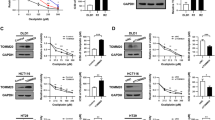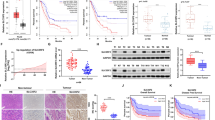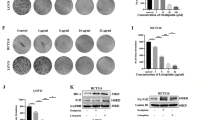Abstract
Oxaliplatin resistance poses a significant challenge in colorectal cancer (CRC) therapy, necessitating further investigation into the underlying molecular mechanisms. This study aimed to elucidate the regulatory role of SNHG4 in oxaliplatin resistance and ferroptosis in CRC. Our findings revealed that treatment with oxaliplatin led to downregulation of SNHG4 expression in CRC cells, while resistant CRC cells exhibited higher levels of SNHG4 compared to parental cells. Silencing SNHG4 attenuated oxaliplatin resistance and reduced the expression of resistance-related proteins MRD1 and MPR1. Furthermore, induction of ferroptosis effectively diminished oxaliplatin resistance in both parental and resistant CRC cells. Notably, ferroptosis induction resulted in decreased SNHG4 expression, whereas SNHG4 overexpression suppressed ferroptosis. Through FISH, RIP, and RNA pull-down assays, we identified the cytoplasmic localization of both SNHG4 and PTEN, establishing that SNHG4 directly targets PTEN, thereby reducing mRNA stability in CRC cells. Silencing PTEN abrogated the impact of SNHG4 on oxaliplatin resistance and ferroptosis in CRC cells. In vivo experiments further validated the influence of SNHG4 on oxaliplatin resistance and ferroptosis in CRC cells through PTEN regulation. In conclusion, SNHG4 promotes resistance to oxaliplatin in CRC cells by suppressing ferroptosis through instability of PTEN, thus serves as a target for patients with oxaliplatin-base chemoresistance.








Similar content being viewed by others
Data availability
All data generated or analyzed during this study are included in this article. The datasets used and/or analyzed in the study are available from the corresponding author on reasonable request.
References
Hsu HH, Chen MC, Baskaran R, Lin YM, Day CH, Lin YJ et al (2018) Oxaliplatin resistance in colorectal cancer cells is mediated via activation of ABCG2 to alleviate ER stress induced apoptosis. J Cell Physiol 233:5458–5467
Zhang C, Xu C, Gao X, Yao Q (2022) Platinum-based drugs for cancer therapy and anti-tumor strategies. Theranostics 12:2115–2132
Alfaro Alfaro AE, Murillo Castillo B, Cordero Garcia E, Tascon J, Morales AI (2022) Colon cancer pharmacogenetics: a narrative review. Pharmacy 10:95
Nussinov R, Tsai CJ, Jang H (2021) Anticancer drug resistance: an update and perspective. Drug Resist Updat 59:100796
Dixon SJ, Lemberg KM, Lamprecht MR, Skouta R, Zaitsev EM, Gleason CE et al (2012) Ferroptosis: an iron-dependent form of nonapoptotic cell death. Cell 149:1060–1072
Liu B, Wang H (2022) Oxaliplatin induces ferroptosis and oxidative stress in HT29 colorectal cancer cells by inhibiting the Nrf2 signaling pathway. Exp Ther Med 23:394
Zhang Q, Deng T, Zhang H, Zuo D, Zhu Q, Bai M et al (2022) Adipocyte-derived exosomal MTTP suppresses ferroptosis and promotes chemoresistance in colorectal cancer. Adv Sci 9:e2203357
Qu X, Liu B, Wang L, Liu L, Zhao W, Liu C et al (2023) Loss of cancer-associated fibroblast-derived exosomal DACT3-AS1 promotes malignant transformation and ferroptosis-mediated oxaliplatin resistance in gastric cancer. Drug Resist Updat 68:100936
Kang X, Huo Y, Jia S, He F, Li H, Zhou Q et al (2022) Silenced LINC01134 enhances oxaliplatin sensitivity by facilitating ferroptosis through GPX4 in hepatocarcinoma. Front Oncol 12:939605
Chu Q, Gu X, Zheng Q, Guo Z, Shan D, Wang J et al (2021) Long noncoding RNA SNHG4: a novel target in human diseases. Cancer Cell Int 21:583
Cheng XB, Zhang T, Zhu HJ, Ma N, Sun XD, Wang SH et al (2021) Knockdown of lncRNA SNHG4 suppresses gastric cancer cell proliferation and metastasis by targeting miR-204-5p. Neoplasma 68:546–556
Wang X, Tian W, Wu L, Wei Z, Li W, Xu Y et al (2020) LncRNA SNHG4 regulates miR-138/c-Met axis to promote the proliferation of glioblastoma cells. NeuroReport 31:657–662
Zhou Z, Tan F, Pei Q, Li C, Zhou Y, Li Y et al (2021) lncRNA SNHG4 modulates colorectal cancer cell cycle and cell proliferation through regulating miR-590-3p/CDK1 axis. Aging 13:9838–9858
Wang X, Yang P, Zhang D, Lu M, Zhang C, Sun Y (2021) LncRNA SNHG14 promotes cell proliferation and invasion in colorectal cancer through modulating miR-519b-3p/DDX5 axis. J Cancer 12:4958–4970
Lv L, Huang B, Yi L, Zhang L (2023) Long non-coding RNA SNHG4 enhances RNF14 mRNA stability to promote the progression of colorectal cancer by recruiting TAF15 protein. Apoptosis 28:414–431
Negri FV, Bozzetti C, Lagrasta CA, Crafa P, Bonasoni MP, Camisa R et al (2010) PTEN status in advanced colorectal cancer treated with cetuximab. Br J Cancer 102:162–164
Zhang Y, Liu X, Zhang J, Xu Y, Shao J, Hu Y et al (2020) Inhibition of miR-19a partially reversed the resistance of colorectal cancer to oxaliplatin via PTEN/PI3K/AKT pathway. Aging 12:5640–5650
Sadrkhanloo M, Paskeh MDA, Hashemi M, Raesi R, Bahonar A, Nakhaee Z et al (2023) New emerging targets in osteosarcoma therapy: PTEN and PI3K/Akt crosstalk in carcinogenesis. Pathol Res Pract 251:154902
Deng J, Wang H, Liang Y, Zhao L, Li Y, Yan Y et al (2023) miR-15a-5p enhances the malignant phenotypes of colorectal cancer cells through the STAT3/TWIST1 and PTEN/AKT signaling pathways by targeting SIRT4. Cell Signal 101:110517
Qian XL, Zhou F, Xu S, Jiang J, Chen ZP, Wang SK et al (2021) MiR-454-3p promotes oxaliplatin resistance by targeting PTEN in colorectal cancer. Front Oncol 11:638537
He Y, Ling Y, Zhang Z, Mertens RT, Cao Q, Xu X et al (2023) Butyrate reverses ferroptosis resistance in colorectal cancer by inducing c-Fos-dependent xCT suppression. Redox Biol 65:102822
Zeng K, Li W, Wang Y, Zhang Z, Zhang L, Zhang W et al (2023) Inhibition of CDK1 overcomes oxaliplatin resistance by regulating ACSL4-mediated ferroptosis in colorectal cancer. Adv Sci 2023:e2301088
Zhan M, Ding Y, Huang S, Liu Y, Xiao J, Yu H et al (2023) Lysyl oxidase-like 3 restrains mitochondrial ferroptosis to promote liver cancer chemoresistance by stabilizing dihydroorotate dehydrogenase. Nat Commun 14:3123
Cao H, Yang M, Yang Y, Fang J, Cui Y (2021) PBK/TOPK promotes chemoresistance to oxaliplatin in hepatocellular carcinoma cells by regulating PTEN. Acta Biochim Biophys Sin 53:584–592
Jin YY, Chen QJ, Xu K, Ren HT, Bao X, Ma YN et al (2016) Involvement of microRNA-141-3p in 5-fluorouracil and oxaliplatin chemo-resistance in esophageal cancer cells via regulation of PTEN. Mol Cell Biochem 422:161–170
Yuan Z, Wang W (2020) LncRNA SNHG4 regulates miR-10a/PTEN to inhibit the proliferation of acute myeloid leukemia cells. Hematology 25:160–164
Zhang L, Wang F, Li D, Yan Y, Wang H (2021) Transferrin receptor-mediated reactive oxygen species promotes ferroptosis of KGN cells via regulating NADPH oxidase 1/PTEN induced kinase 1/acyl-CoA synthetase long chain family member 4 signaling. Bioengineered 12:4983–4994
Yi J, Zhu J, Wu J, Thompson CB, Jiang X (2020) Oncogenic activation of PI3K-AKT-mTOR signaling suppresses ferroptosis via SREBP-mediated lipogenesis. Proc Natl Acad Sci U S A 117:31189–31197
Mondal P, Meeran SM (2023) Emerging role of non-coding RNAs in resistance to platinum-based anti-cancer agents in lung cancer. Front Pharmacol 14:1105484
Shi CJ, Xue ZH, Zeng WQ, Deng LQ, Pang FX, Zhang FW et al (2023) LncRNA-NEF suppressed oxaliplatin resistance and epithelial-mesenchymal transition in colorectal cancer through epigenetically inactivating MEK/ERK signaling. Cancer Gene Ther 30:855–865
Li X, Chen X, Fu C, Xie M, Ouyang S (2023) LncRNA BCAR4 promotes oxaliplatin resistance in colorectal cancer by modulating miR-484–3p/RAB5C expression. Chemotherapy 68(3):119–130
Luo L, Zhang X, Rousuli Y, Aini A (2022) Exosome-mediated transfer of miR-3613-5p enhances doxorubicin resistance by suppression of PTEN expression in breast cancer cells. J Oncol 2022:9494910
Jones C, Dziadowicz S, Suite S, Eby A, Chen WC, Hu G et al (2022) Emergence of resistance to MTI-101 selects for a MET genotype and phenotype in EGFR driven PC-9 and PTEN deleted H446 lung cancer cell lines. Cancers 14:3062
Richards KE, Xiao W, Hill R (2022) On behalf of the usc pancreas research T. cancer-associated fibroblasts confer gemcitabine resistance to pancreatic cancer cells through PTEN-Targeting miRNAs in exosomes. Cancers 14:2812
Iskar M, Campillos M, Kuhn M, Jensen LJ, van Noort V, Bork P (2010) Drug-induced regulation of target expression. PLoS Comput Biol 6:e1000925
Gu W, Shen H, Xie L, Zhang X, Yang J (2022) The role of feedback loops in targeted therapy for pancreatic cancer. Front Oncol 12:800140
Nussinov R, Tsai CJ, Jang H (2017) A new view of pathway-driven drug resistance in tumor proliferation. Trends Pharmacol Sci 38:427–437
Koeberle SC, Kipp AP, Stuppner H, Koeberle A (2023) Ferroptosis-modulating small molecules for targeting drug-resistant cancer: Challenges and opportunities in manipulating redox signaling. Med Res Rev 43:614–682
Wang G, Wang JJ, Zhi-Min Z, Xu XN, Shi F, Fu XL (2023) Targeting critical pathways in ferroptosis and enhancing antitumor therapy of Platinum drugs for colorectal cancer. Sci Prog 106:368504221147173
Yang WS, SriRamaratnam R, Welsch ME, Shimada K, Skouta R, Viswanathan VS et al (2014) Regulation of ferroptotic cancer cell death by GPX4. Cell 156:317–331
Yang C, Zhang Y, Lin S, Liu Y, Li W (2021) Suppressing the KIF20A/NUAK1/Nrf2/GPX4 signaling pathway induces ferroptosis and enhances the sensitivity of colorectal cancer to oxaliplatin. Aging 13:13515–13534
Han Y, Gao X, Wu N, Jin Y, Zhou H, Wang W et al (2022) Long noncoding RNA LINC00239 inhibits ferroptosis in colorectal cancer by binding to Keap1 to stabilize Nrf2. Cell Death Dis 13:742
Acknowledgements
Not applicable.
Funding
This study was partially supported by research funding from the National Natural Science Foundation of China (No. 82160446). Guangxi Medical and health key discipline construction project; the Training Program for 1000 Young and Middle-aged Key Teachers in Guangxi.
Author information
Authors and Affiliations
Contributions
Study concept and design: LSQ, YYX and HBL; Collection and assembly of data: LSQ, WHT and XLY; Performed the experiment: LSQ, LKZ, XWT, XMZ and LF; Data analysis and interpretation: LSQ, DHW, LKZ and YYX; Manuscript writing and review: All authors. All authors have read and approved the manuscript in its current state.
Corresponding author
Ethics declarations
Conflict of interests
The authors declare that they have no competing interests.
Ethical approval and consent to participate
This study was approval by the Ethics Committee of Guangxi Medical University Cancer Hospital. The animal experimental procedures in mice were approved by the ethics committee of Animal Experiments of Guangxi Medical University. All the procedures were carried out in accordance with institutional guidelines.
Consent for publication
All authors read and approved the final manuscript.
Additional information
Publisher's Note
Springer Nature remains neutral with regard to jurisdictional claims in published maps and institutional affiliations.
Supplementary Information
Below is the link to the electronic supplementary material.
Rights and permissions
Springer Nature or its licensor (e.g. a society or other partner) holds exclusive rights to this article under a publishing agreement with the author(s) or other rightsholder(s); author self-archiving of the accepted manuscript version of this article is solely governed by the terms of such publishing agreement and applicable law.
About this article
Cite this article
Li, Sq., Xu, Wt., Yin, Yx. et al. SNHG4-mediated PTEN destabilization confers oxaliplatin resistance in colorectal cancer cells by inhibiting ferroptosis. Apoptosis 29, 835–848 (2024). https://doi.org/10.1007/s10495-024-01948-3
Accepted:
Published:
Issue Date:
DOI: https://doi.org/10.1007/s10495-024-01948-3




